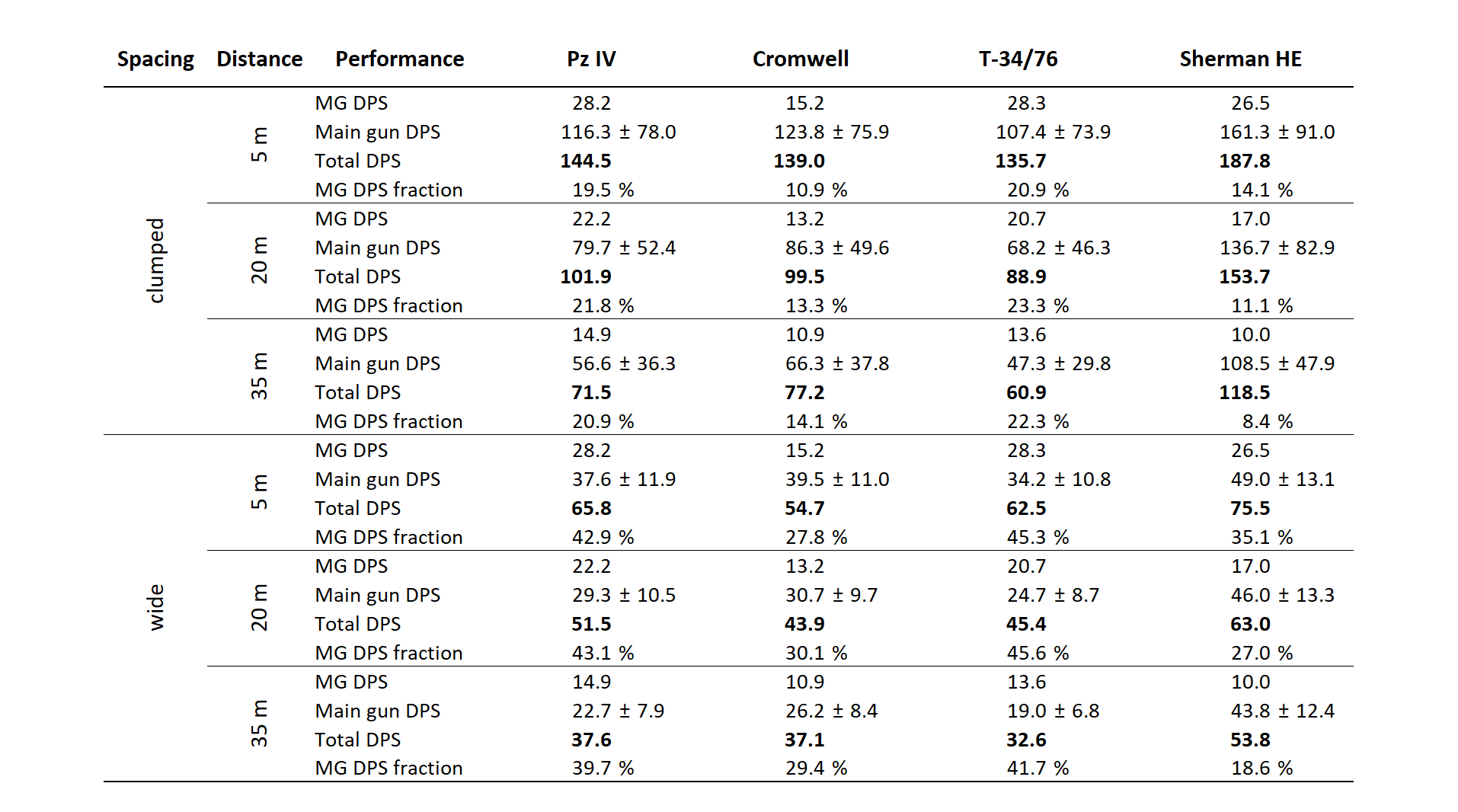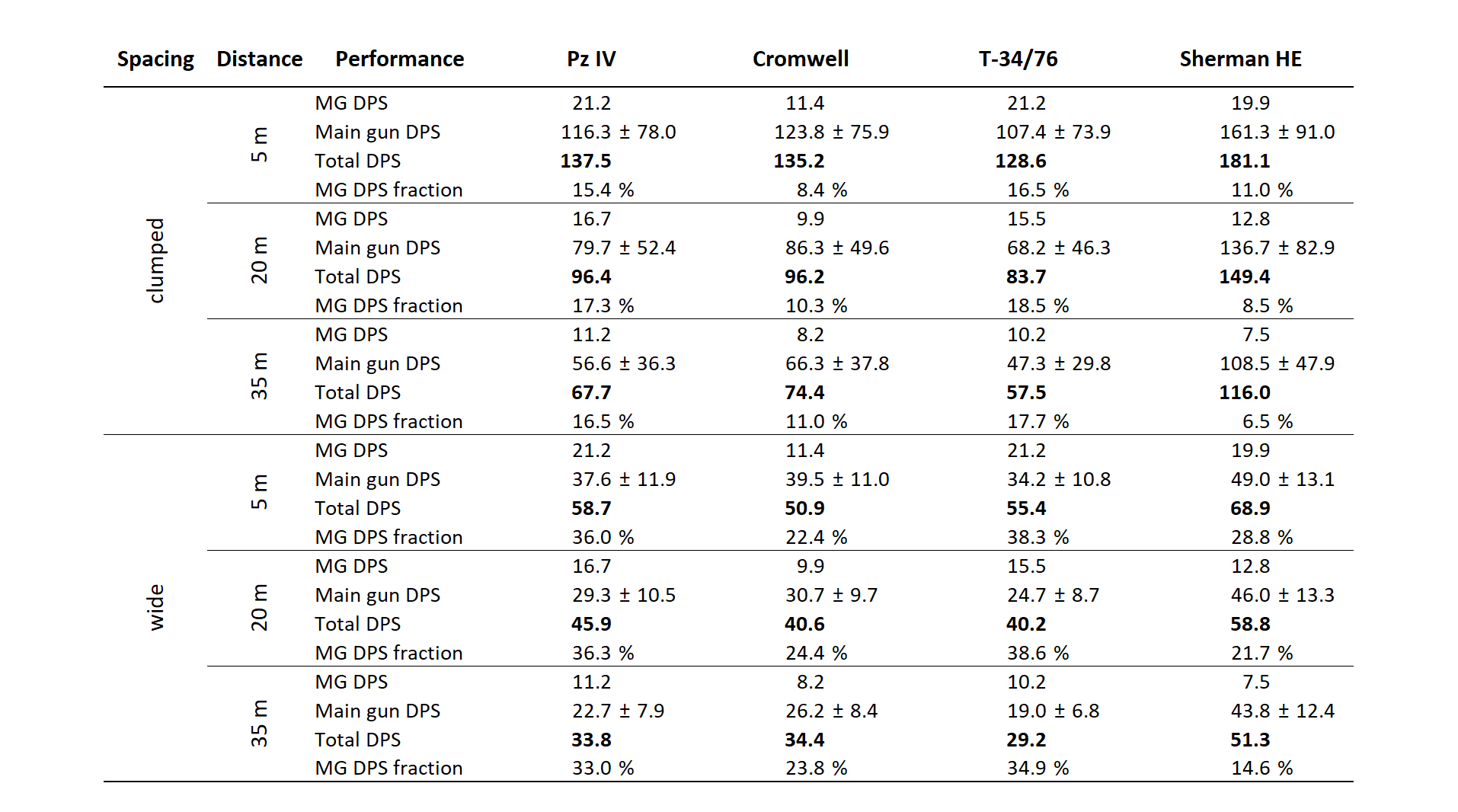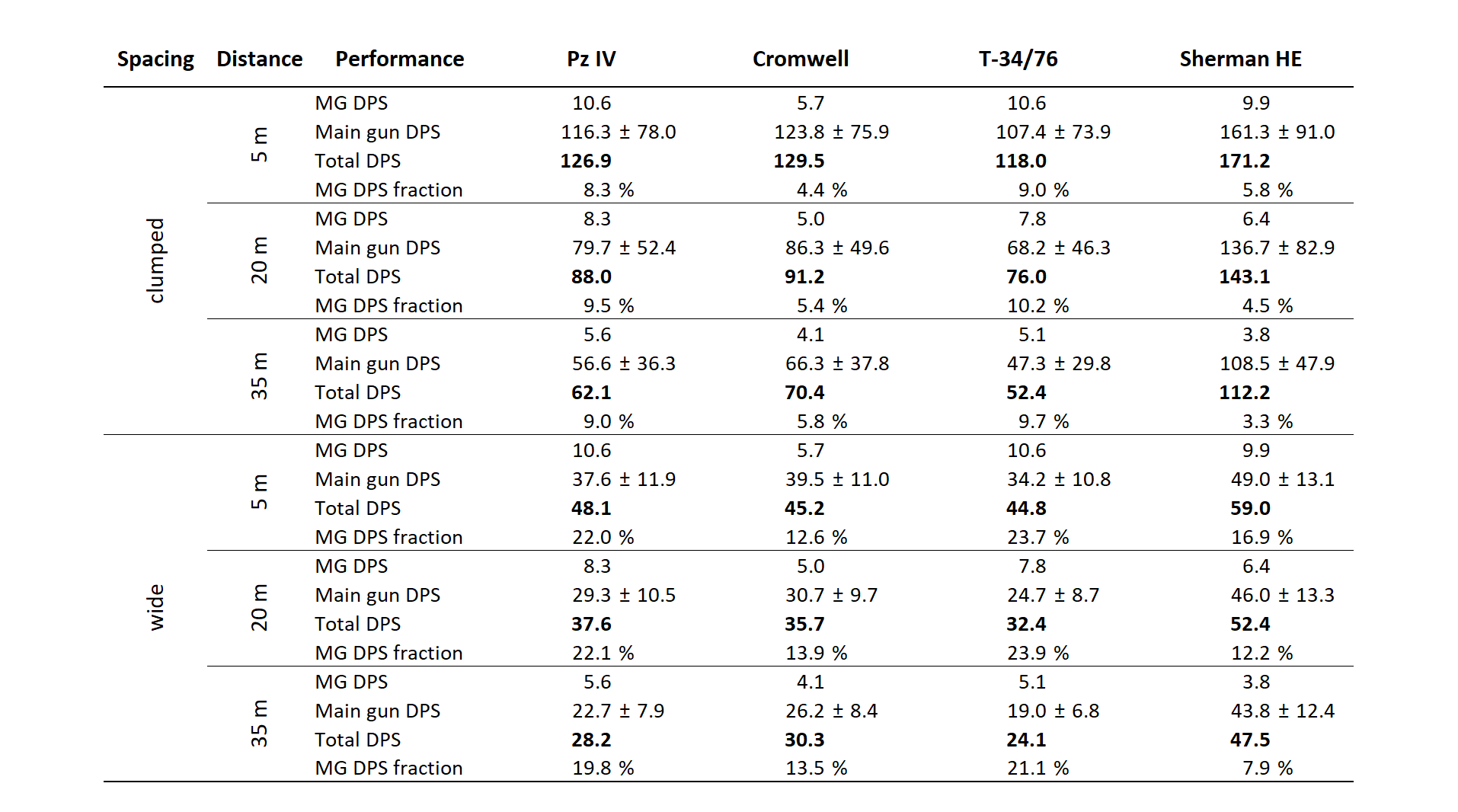This is gonna be one of these ‘wall of text’ posts that may be quite a chore to read till the end, so be warned. There’s a TL;DR at the bottom, so in case you’re not into the more theoretical part, feel free to skip to the conclusion. Now with this out of the way, let’s go.
Preface
There’s been quite some debate about the anti-infantry power level of medium tanks in the Balance Preview feedback threads recently, with some putting the Cromwell on the bottom of the tier list due to its “shitty” MGs, and others complaining about the T-34’s alleged sub-par AI performance as a result of the 76 mm gun being trash against infantry and tanks alike.
I think much of the controversy (beside the obvious “nerf red – buff blue” faction bias) stems from the fact that there’s no real benchmark combining main gun and MG AI performance into a handy indicator that would allow objective conclusions to be drawn. This shouldn’t be too surprising, since the interaction of scatter and AoE profiles make the main gun AI notoriously difficult to assess, as compared to the more accessible, accuracy-based MG DPS. The latter being single target, while AoE damage obviously affects multiple entities at once doesn’t really help the case, either.
Having tried to work out the main gun AI part of the equation recently, I was wondering how much the various hull/coax/pintle MGs actually provide to the total damage output of a given tank and if both could possibly be combined into a single DPS indicator.
Methodology
In order to calculate such a combined DPS value, it is of course necessary to first obtain the total DPS output of the MGs and that of the main gun. Luckily, the former is quite handily accessible from this awesome site, so I didn’t have to go through the hassle of figuring out how to calculate these myself. (Note that in lieu of actual numbers I’ve taken the liberty to “guesstimate” the DPS values at 5, 20 and 35 m from the displayed charts. This may not be 100% accurate to the last digit, but should suffice for simplicity’s sake).
The second part is a bit more tricky, as the main gun damage output is inherently random and varies significantly with distance to target, formation and model spacing to name a few. Furthermore, the AoE of the explosion typically affects multiple entities at once, so it will scale with the total model count of the target squad as opposed to that of an MG, which naturally is single-target only.
To get a rough number for the theoretical single-target DPS of the main gun I’ve therefore taken the combined HP of 6 full-health entities (480 HP) and divided it by time-to-kill values against a 6-man squad in either clumped or wide formation at a distance of 5, 20 or 40 m calculated here. This gives an average “squad-based” DPS value (i.e. the damage each squad member receives per second) that, when multiplied by 6 for the model count, yields a single target DPS equivalent that can now be combined with the MG DPS.
Results
Now, with these two values in hand, how do they fit together and what does that mean for the AI performance of a given medium?
The answer is, unfortunately, a tad bit more complex to be represented by a single number. Both scatter (main gun DPS) and accuracy (MG DPS) scale with distance, and other modifiers like target size (or received accuracy) bonuses from veterancy or abilities as well as from cover will dilute the MG DPS (technically, also the main gun DPS, but the effect is negligible) even further. Therefore, let’s have a look how the Ostheer Pz IV, British Cromwell, Soviet T-34/36 and, as the true benchmark for anti-infantry potency, the USF M4 Sherman tank equipped with HE shells perform in three different scenarios.
1) Target size = 1, no cover
In the first example, let’s assume the target squad (6 members at full health) does not receive any reduction to target size through vet or cover, assumes either a loose or a clumped formation and is attacked from 5, 25 and 35 m distance. The following table sums up the respective contributions of the main gun, MGs (assuming both hull and coaxial MGs are facing the target and pintle mount upgrades, if available, are purchased), total resulting DPS and the percentage the MGs contribute to the overall damage output:

DPS Table for Target Size = 1, no cover.
Obviously, the difference in main gun/total DPS against wide and clumped formations is huge, since for loose spacing only 2 or 3 models can be caught in the AoE at a time, while all members of the tight formation easily fit into the blast radius of any of the tank cannons. Hence, these two cases can be regarded as the respective minimum (i.e. roughly single target) and maximum bounds for AoE DPS. Squad spacing has no influence on the MG DPS output, but due to the scaling of scatter as well as accuracy and other MG DPS-related stats (e.g. burst length, cooldown, aim time, etc.) with distance, both MG and main gun DPS decline rapidly with increasing distance to target.
Concerning the overall DPS, it comes to no surprise that the HE Sherman with its powerful MGs and large AoE easily beats every other tank in any possible scenario. Behind the top spot it gets interesting though: Despite having lower main gun DPS, both the Pz IV and the T-34 perform similar or better than the Cromwell at close range thanks to dishing out almost double the amount of MG DPS. However, this advantage diminishes quickly at longer distances where the lower reliance on MG DPS lets the Cromwell almost climb to 2nd spot.
What’s also apparent is that, especially against clumped targets and at point blank range, the contribution of the MGs to the total DPS is relatively small, but non-negligible (10-20%). Only against spread out targets and for the Pz VI and T-34 it starts to become really significant (up to 45%).
But wait… there’s more!
2) Target size = 0.75, no cover
So far we’ve only covered the ideal scenario in terms of MG damage: high target size and no benefit of cover. Naturally, things change a lot as the game progresses and infantry squads start to vet up, making it much more difficult to be hit by non-explosive weaponry. Assuming a modest gain in received accuracy, the target sizes of several units can drop significantly below the 0.75 threshold arbitrarily picked in the next example shown below:

DPS Table for Target Size = 0.75, no cover.
Now the chunk of the total DPS the MGs provide gets noticeably lower, making the Cromwell look even better in comparison.
But again, that’s not the end of the road. We still have more to… well… cover!
3) Target size = 0.75, light cover
As mentioned before, there’s another source of target size – and hence MG DPS – reduction that also gets more and more abundant the longer the game progresses: light cover. Craters of all sizes and shapes will be plentiful in the late game and cut MG DPS in half for every model hiding inside. As a result, the contribution of MGs gets marginalized against clumped squads in the majority of fights with typically over 90% of the DPS being dealt by the main gun.

DPS Table for Target Size = 0.75, no cover.
Conclusion or TL;DR
While MGs bring a lot of nominal anti-infantry power to the table, the main source of AI DPS remains the tank gun under realistic in-game conditions (i.e. abundance of yellow cover, reduced target size). Notable exceptions are fights against spread-out entities, for which the effectiveness of AoE damage drops significantly, as well as early engagements with unvetted squads out of cover.
Furthermore, the combined main gun and MG DPS value should allow a more accurate and straightforward comparison of AI strength than juggling with blast radii, AoE profiles, scatter values and MG DPS curves.
Any thoughts or comments, let me know!
-MMX-

















 cblanco ★
cblanco ★  보드카 중대
보드카 중대  VonManteuffel
VonManteuffel  Heartless Jäger
Heartless Jäger 